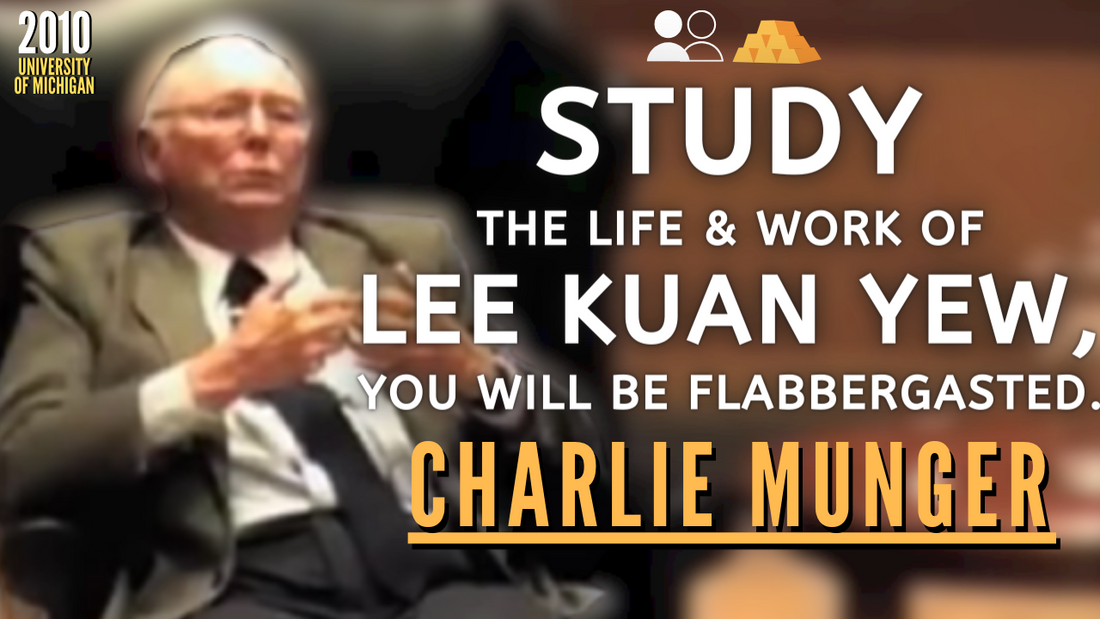
Charlie Munger's speech on Lee Kuan Yew will give you GOOSEBUMPS. | UM 2010【C:C.M Ep.201】
[Transcript]
AUDIENCE MEMBER: Hi, thanks for being here. I'm a dual Master's student between the business school and school of natural resources. And I have a question regarding rationality and behavior – you talked a lot about it – and also, how systems are set up to encourage perverse – well, with perverse incentives.
And if you could design a system, how would you take into consideration human nature so that it enables rationality?
CHARLIE MUNGER: Well, I'm glad you saved that easy question for the last. (Laughter)
Plato failed at this question, you know, I mean, why can't some man well along in his 87th year describe a perfect civilization. It's a very interesting problem that our founders coped with and just how democratic you wanted the system.
My favorite political system in terms of being adapted to its particular circumstances successfully is Singapore. I think Singapore is the single most successful governmental system that exists in the world. They've taken a small swamp from no to a very creditable place. They're doing the Lord's work in a number of very important ways.
I'm sorry, they're bringing in derivatives trading even heaven makes mistakes. (Laughter) But that doesn't mean I want Singapore tomorrow in the United States, but – I think the Singapore's habit of stepping hard on things that will grow like cancer is the correct way to govern.
And in America, we tend to wait till our unfixable and then we want to fix them. How well are you gonna – if you want to take a problem while it's solvable and wait till it's unfixable, you can argue that you're so damn foolish that you deserve the problem. And we have a system that is pretty irresponsible in many ways and I think our central cities get to be the hardest ones to govern on average.
And I think that's very awkward, and finally they reach a tipping point where you get this the better people leave. And then, I don't think you can solve the problem by any normal way, certainly not for civilization as large as previously existed there, or if you solve it, it's a hundred years in the future or 50 years in the future or something.
But no, I can't, I – I don't think it's a pure democracy with a – I think our system has worked.
Well, I could tell the story on myself, I come to the University of Michigan, I take political science. I'm an unusual kid, I don't mean I'm unusual-looking or unusual dressing or something, but I unusually think often that I know better than the professor. This is not a social winner. (Laughter)
And I take political science from a leftist but lovable political science professor. And everybody teaches the more people that vote, the better the systems will work. And having a contrarian streak, I'm not so damn sure the civilization doesn't work better when a lot of people don't vote.
So I write a paper, it couldn't have been more politically correct. I got an A. The University of Michigan not only does right in the hospital, it handle wise ass kids pretty well. (Laughter)
And so anyway, the – I can't – if you want to study, you take Singapore, a terrible malaria problem, it's a swamp. He drains the swamps, he's not care if some little fish dies. He has a drug problem, he searches the world over for the right solution to the drug problem, he finds that in United States. Isn't that an interesting thing?
Imagine somebody in Singapore reading books and deciding the United States was the answer to Singapore's problem. He copied the military's drug bottle policy that anybody in Singapore will pee in a bottle instantly on demand and if they flunk, they go immediately to a tough compulsory rehab. Away went the drug problem.
Just time, after time, after time, he made these winning decisions. He wanted the place to be prosperous. He figured out who he wanted to come in and he made the civilization very user-friendly to what he wanted to attract, and it worked.
Then it's 70% Chinese and 30% percent Malays, every Chinese thinks the Chinese are superior to the Malays, and he thinks that's terribly counterproductive if anybody should ever say so. So he passes a law, you can't say if you're Chinese in Singapore, you think there's any superiority in the Chinese. I think that's a very sensible law for Singapore to have, but of course, it has some infringement of free speech. (Laughter)
But anyway, just time, after time, after time he's done this thing.
His approach to marriage was interesting, the average very successful man and the Asian culture marries an exceptionally good-looking woman who somewhat dumber than he is. This is the system.
Well, this guy was so smart that he was the 2nd ranked school student in his high school and the student that was one-tenth of a percentage point higher was female. So he didn't follow the Asian rule of hiring the beautiful woman with the big boobs, it's a little dumber than you are. He married this woman who was a tenth of a point higher.
And who is now the Prime Minister of Singapore? Their son.
And this is a very unusually successful man. That's a very unusually successful history. So while I can't answer your question, if you will make a study of the life and work of Lee Kuan Yew, you will find one of the most interesting and instructive political stories written in the history of mankind. This is better than Athens, better than – this is an unbelievable history and you will learn a lot that will be useful in your whole life.
So my answer to you is don't ask Charlie Munger, study the life and work of Lee Kuan Yew, you're going to be flabbergasted.
(Source: https://youtu.be/Pph3Bg8Pihg)
[YAPSS Takeaway]
